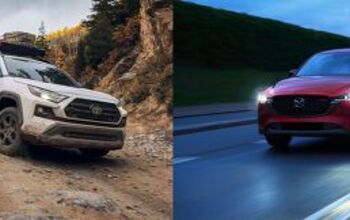GM to Shed Five North American Plants, Numerous Products, Amid Restructuring Drive

Heavy-duty streamlining has reached the production level at General Motors. After last night’s bombshell (though not unexpected) report claiming Canada’s oldest auto plant would cease operations late next year, more news is trickling out about the automaker’s production future.
Add Ohio and Michigan to the list of locales expected to lose an assembly plant.
According to Nick Bunkley of Automotive News, Detroit-Hamtramck and Lordstown Assembly, makers of GM’s full-size front-wheel drive products and the Chevrolet Cruze, will join Oshawa Assembly in closing its doors. Both American plants now operate on one shift, with no shortage of downtime last year to curtail ballooning inventory.
Oshawa, of course, builds the marked-for-death Cadillac XTS and Chevrolet Impala, which also sees assembly in Hamtramck. Shift workers walked off the job this morning at the Ontario plant, which, like its American counterparts, possessed an increasingly hazy future. Roughly 2,500 unionized workers and 300 salaried employees call the plant home.
Unifor, the union representing Detroit Three autoworkers in Canada, stated Sunday night that there was no product allocated to Oshawa after December 2019.
“Based on commitments made during 2016 contract negotiations, Unifor does not accept this announcement and is immediately calling on GM to live up to the spirit of that agreement,” the union said in a media release. “Unifor is scheduled to hold a discussion with General Motors tomorrow and will provide further comment following the meeting.”
Meanwhile, Reuters reports that discussions that took place between GM and the UAW last year will surely ramp up again. Those talks concerned falling sedan sales and what to do with underutilized plants like Hamtramck and Lordstown. Now, the context is clearer. With GM offering buyouts to 50,000 salaried workers across the globe and angling for a heavily electrified product lineup in the not-so-distant future, the dinosaurs must die. Sales of the Impala, XTS, CT6, and Buick LaCrosse are, like the Cruze, down significantly in 2018. However, Hamtramck also builds the electrified Chevy Volt.
Update: GM CEO Mary Barra, speaking at a media conference this morning, has confirmed that the three aforementioned plants, as well as Warren Transmission and the company’s Baltimore operations, will cease to exist by the end of next year. She also confirmed that the shuttering of the plants, expected to save the company $6 billion in 2020, spells the discontinuation of the products built at those plants.
According to The Detroit News, this means the loss of 3,300 U.S. jobs. UAW contracts are up for renegotiation next year.
[Images: General Motors]

More by Steph Willems
Latest Car Reviews
Read moreLatest Product Reviews
Read moreRecent Comments
- Varezhka I have still yet to see a Malibu on the road that didn't have a rental sticker. So yeah, GM probably lost money on every one they sold but kept it to boost their CAFE numbers.I'm personally happy that I no longer have to dread being "upgraded" to a Maxima or a Malibu anymore. And thankfully Altima is also on its way out.
- Tassos Under incompetent, affirmative action hire Mary Barra, GM has been shooting itself in the foot on a daily basis.Whether the Malibu cancellation has been one of these shootings is NOT obvious at all.GM should be run as a PROFITABLE BUSINESS and NOT as an outfit that satisfies everybody and his mother in law's pet preferences.IF the Malibu was UNPROFITABLE, it SHOULD be canceled.More generally, if its SEGMENT is Unprofitable, and HALF the makers cancel their midsize sedans, not only will it lead to the SURVIVAL OF THE FITTEST ones, but the survivors will obviously be more profitable if the LOSERS were kept being produced and the SMALL PIE of midsize sedans would yield slim pickings for every participant.SO NO, I APPROVE of the demise of the unprofitable Malibu, and hope Nissan does the same to the Altima, Hyundai with the SOnata, Mazda with the Mazda 6, and as many others as it takes to make the REMAINING players, like the Excellent, sporty Accord and the Bulletproof Reliable, cheap to maintain CAMRY, more profitable and affordable.
- GregLocock Car companies can only really sell cars that people who are new car buyers will pay a profitable price for. As it turns out fewer and fewer new car buyers want sedans. Large sedans can be nice to drive, certainly, but the number of new car buyers (the only ones that matter in this discussion) are prepared to sacrifice steering and handling for more obvious things like passenger and cargo space, or even some attempt at off roading. We know US new car buyers don't really care about handling because they fell for FWD in large cars.
- Slavuta Why is everybody sweating? Like sedans? - go buy one. Better - 2. Let CRV/RAV rust on the dealer lot. I have 3 sedans on the driveway. My neighbor - 2. Neighbors on each of our other side - 8 SUVs.
- Theflyersfan With sedans, especially, I wonder how many of those sales are to rental fleets. With the exception of the Civic and Accord, there are still rows of sedans mixed in with the RAV4s at every airport rental lot. I doubt the breakdown in sales is publicly published, so who knows... GM isn't out of the sedan business - Cadillac exists and I can't believe I'm typing this but they are actually decent - and I think they are making a huge mistake, especially if there's an extended oil price hike (cough...Iran...cough) and people want smaller and hybrids. But if one is only tied to the quarterly shareholder reports and not trends and the big picture, bad decisions like this get made.




































Comments
Join the conversation
Gotta love those tariffs on imported steel and aluminum, eh? The tarriffs didn't just increase the price of imports, they increased the price of domestic produced metals as well. Which industry consumes the most steel and aluminum in the US?
Typical of American manufacturers... short-sighted, interested only in shareholder value, not in competing at a high level of quality and customer satisfaction over the long term. GM is losing billions in its electric division, while Toyota is positioning itself to own the market in every vehicle segment as technology changes over the next 20 years. State of the art plants being built here, and young design teams working on trail-blazing products, while the American companies pick up the pieces of yet another failed strategy. Toyota and Honda have no plans to discontinue the Accord, Corolla, Camry or Avalon. I have no doubt they'll gladly hire some of those experienced laid off GM workers who built the Impala, Cruze and Volt. They'll also gladly add disenchanted GM buyers to their growing list of satisfied customers. I chose an American car for the first time in decades when I bought first a Ford Escape Hybrid in 2008, then a 2016 Impala. Great vehicles, great design. Poor marketing execution by a poorly managed company. The Impala led the pack in the Consumer Reports ratings two years running. Why not build on that success, instead of forcing sedan lovers and Hybrid SUV fans to the foreign competition? Now I'll be leaving thousands of dollars on the table when I'm forced to sell the Impala and move on to a more trustworthy, high quality, well-run company. I'll move to an Avalon, Camry or Accord, or if I choose an SUV, it'll be a Subaru or Toyota. And it will be the last time I trust an American car company.